2011 年广西桂林市中考英语真题及答案
(考试用时:120 分钟 满分:120 分)
注意事项:1.试卷分为试题卷和答题卡两部分,在本试题卷上作答无效
..........。
2.答题前,请认真阅读答题卡上....的注意事项。
3.考试结束后,将本试卷和答题卡
.......一并交回。
一、 听力测试(每小题 1 分,共 30 分)
第一节 听音辨图
请听句子,选出与所听句子内容相符的图画,将其标号在答题卡上涂黑。每个句子读一遍。
1.
2.
3.
4.
5.
第二节 情景反应
�
请听句子,选出正确的答语,将其标号在答题卡上涂黑。每个句子读一遍。
6. A. Good morning.
B. Good afternoon.
C. Good evening.
7. A. This is a ruler.
B. It’s a pencil.
C. They are pens.
8. A. Good idea.
B. No, thanks.
C. It’s too hot.
9. A. It’s autumn.
B. It’s June 26th.
C. It’s fine.
10. A. Yes, they are.
B. Yes, he is.
C. Yes, I am.
11. A. Have a good time.
B. Don’t worry.
C. Yes, I do.
12. A. Last week.
B. Yesterday.
C. Tomorrow.
13. A. I’d like a dress.
B. Do it please.
C. That’s all right.
14. A. Yes, I think so.
B. Thank you.
C. I’d like to.
15. A. She is my sister.
B. She is beautiful.
C. She is good at English.
第三节 对话理解
A. 请听五组对话,每组对话后您将听到一个问题,请根据对话内容选出正确答案,将其标号在答题卡
上涂黑。每组对话和问题读两遍。
16. A. In the office.
B. In the house.
C. In the car.
17. A. Mary’s.
18. A. A dog.
19. A. Lipu.
B. Sam’s.
B. A cat.
C. Jim’s.
C. A chick.
B. Xing’an.
C. Longsheng.
20. A. In a hospital.
B. In a shop.
C. In a cinema.
B. 请听一段对话,对话后您将听到五个问题,请根据对话内容选出正确答案,将其标号在答题卡上涂
黑。对话和问题读两遍。
21. A. Tiger.
22. A. Guangxi.
23. A. A banana.
24. A. Asia.
25. A. Two.
第四节 语篇理解
B. Panda.
B. Yunnan.
B. A pear.
B. Europe.
B. Three.
C. Monkey.
C. Sichuan.
C. An apple.
C. Africa.
C. Four.
请仔细听短文,并根据短文内容补全以下信息,每空填一词,将单词写在答题卡上。短文读两遍。
In the USA, Mother’s Day is a holiday on the second Sunday in May. It is
�
a day when children give their mothers cards, presents and flowers.
·One of the best
26
to celebrate Mother’s Day is to give mothers the
day off. Let
them have a good rest. The following are what the Americans usually do on that
day.
·Many families
27
Mother’s Day with breakfast in bed.
·After the food is cooked, put them on a plate with the only one flower that
is the
28
from the garden.
·Carry
29
the plate and mom’s favourite books or newspapers up to her
bedroom
when everything is ready.
·Many families take mom out to her favourite
30
for dinner.
二、单项选择(每小题 1 分,共 10 分)
请选择最佳答案,将其标号在答题卡上涂黑。
31. This is _______ MP4. Yours is over there.
A. my
B. me
C. I
D. mine
32. Look! The boys _______ football on the playground.
A. plays
B. play
C. are playing
D. played
33. — Have you ever been to Nanning? — Yes, _______ .
A. I was
B. I do
C. I am
D. I have
34. Li Hua’s shoes are as _______ as Zhang Hui’s.
A. cheap
B. cheaper
C. the cheaper
D. the cheapest
35. _______ smoke here, dad. Smoking has been banned in public places.
A. Don’t be
B. Don’t
C. Not to be
D. Be not
36. Grandma is ill. I have to ________ her at home.
A. look for
B. look up
C. look at
D. look after
37. The basketball ________ I bought yesterday cost me 80 yuan.
�
A. that
B. where
C. who
D. when
38. Many trees and flowers ________ in our city every year.
A. planted
B. are planted
C. were planted D. plants
39. I want to know ________ he will be the volunteer in the 2011 Universiade (世界大学生运动
会) in Shenzhen.
A. where
B. who
C. if
D. which
40. Mr Wang does what he can ________ us improve our English.
A. help
B. to help
C. helping
D. helped
三、补全对话(每小题 1 分,共 5 分)
根据对话内容,从下面方框所给的选项中选出合适的句子补全对话,将其标号在答题卡上涂黑。
Alice: Hello?
Susan: Hello.
41
Alice: Yes, it is.
Susan:
42
Would you like to go to the
bookstore
with me tomorrow? I’d like to buy some books.
Alice: Sorry. I don’t need any books.
43
I can read books on the Internet.
A. It’s Susan here.
B. I’ve got my computer.
C. Is that Alice?
D. When shall we meet?
Susan: Yes, but you can’t always read on the computer.
44
Alice: Oh, I see.
Susan: And in the bookstore we can find many wonderful books.
Alice: OK. I’ll go with you.
45
Susan: What about three o’clock tomorrow afternoon?
Alice: Great. See you then.
Susan: See you.
四、完形填空 (每小题 1 分,共 10 分)
请阅读下面短文,选择最佳答案,将其标号在答题卡上涂黑。
Li Dong is a farmer. He has a very big
46
. On the farm, he grows oranges, grapes and bananas.
Many people come to
47
his farm. He is a successful young man and becomes very famous.
�
In 2003, he went back to his hometown
48
he finished middle school. “What work can I
do?” he said to himself. Then he had an idea. “I’m interested
49
farming. I can grow fruit!”
He began to watch many
50
on TV about growing fruit. He also read a lot of books about it.
Then he went to
51
on Mr Wang’s farm for two years. He learned a lot there.
In 2005, he started his own fruit farm.
52
, Li Dong’s farm was small. But now, his farm
is much
53
. His fruits are very good. He sends them to many big
54
in China, such as
Shanghai, Beijing and Guangzhou. He also grows vegetables and raises chickens on his farm. His
family eats very
55
food. He has a very happy family.
46. A. farm
47. A. look
B. park
B. take
48. A. since
B. after
49. A. in
B. on
C. school
D. shop
C. visit
D. notice
C. though
C. at
D. so
D. for
50. A. games
B. concerts
C. programmes
D. plays
51. A. see
B. play
C. eat
D. work
52. A. At last
B. At that time
C. At this moment
D. At once
53. A. big
B. bigger
C. the biggest
D. biggest
54. A. villages
B. schools
C. cities
D. farms
55. A. healthy
B. bad
C. terrible
D. unhealthy
五、阅读理解 (共 35 分,第 56-60 小题,每小题 1 分;第 61-75 小题,每小题 2 分)
A
Tom was three years old. He liked to watch TV with his parents after supper, but his parents
never let him stay long. Mother would say, “It’s eight o’clock now. It’s time for you to go
to bed, Tom.”
“But why don’t you go to bed, too?” Tom always asked.
“We are adults (大人),” mother would say, “And adults go to bed late.”
One evening Tom asked his mother for an apple.
“But it’s too late,” his mother didn’t want to give him anything to eat at bedtime. “The
apples are already asleep.”
“But not all of them, Mom.” Tom said, “The baby apples are perhaps asleep, but their parents
�
are surely awake.”
请根据短文内容,选择最佳答案, 将其标号在答题卡上涂黑。(每小题 1 分,共 5 分)
56. Tom liked to watch TV with_________ after supper.
A. his father and mother
B. his sister
C. his grandparents
D. his brother
57. His parents _______let him stay long.
A. never
B. sometimes
C. often
D. usually
58. One evening Tom asked his mother for_________.
A. an egg
B. an apple
C. an orange
D. a pear
59. His mother didn’t want to give anything to him to eat________.
A. in the morning
B. in the afternoon
C. at bedtime
D. at noon
60. From the story we know__________.
A. Tom was a quiet boy
B. Tom was a bad boy
C. Tom was a lazy boy
D. Tom was a clever boy
B
The 16th Asian Games was held from November 12th to 27th
in 2010 in Guangzhou, China. There were 41 events in the
Games.
China got 199 gold medals and reached the total medals of
416. Guangzhou was the second Chinese city to host the Asian
Games. In 1990 Beijing held the 11th Asian Games.
Premier Wen Jiabao went to Shanxi province on April 2nd ,
2011. He made a three-day visit to impoverished(穷困的)
Luliang. During his visit, he said that farmers’ right
(权利)must be protected and he warned(警告) that no land
should ever be taken against a farmer’s will(意愿).
�
The Beijing-Shanghai High Speed Railway will be put
into operation at the end of June, 2011. The journey takes
about five hours. The train can reach speeds of up to 380
kilometers an hour. The passenger volume (容量) is expected
to reach 160 million a year, marking(标志) a great step in
China’s Railway development.
请根据以上信息,选择正确答案,将其标号在答题卡上涂黑。(每小题 2 分,共 10 分)
61. The 16th Asian Games was held in __________.
A. Guangzhou
B. Shanghai
C. Beijing
D. Tokyo
62. How many gold medals did China get in the 16th Asian Games ?
A. 11.
B. 41.
C. 199.
D. 416.
63. ________ went to Shanxi province on April 2nd , 2011.
A. A farmer
B. Our premier
C. A worker
D. A passenger
64. Premier Wen Jiabao said that_________ right must be protected.
A. officials’
B. women’s
C. students’
D. farmers’
65. The Beijing-Shanghai High Speed Railway will be put into operation at the end of _______,
2011.
A. June
B. July
C. August
D. September
C
A hobby can be almost anything that a person likes to do in his spare time. Hobbyists raise
pets, watch birds, paint pictures, play the piano and grow flowers.
66
They collect everything
from books to butterflies and from boxes to stamps.
People take up hobbies because these activities offer enjoyment, friendship and relaxation.
Hobbies help people relax after a long time of hard work, and provide a balance (平衡) between
work and play. Hobbies offer interesting activities for the old. Some hobbies can make a child
grow as a person, develop his interest and help him learn new skills.
67
Doctors have found
that hobbies are useful in helping patients (病人) recover (恢复) from illness. Hobbies give
patients who can’t move around something to do, and provide interests that keep them from thinking
about themselves. Many hospitals treat (治疗) patients by having them take up interesting hobbies.
68
�
In early times, most people were too busy making a living to have many hobbies. But some persons
who had spare time did enjoy hobbies.
69
People today have more time than ever before for
hobbies. Machines have now reduced much time that people must spend on their jobs.
70
Those who have developed hobbies never need to worry about what to do with their newly-found
free time hours.
Sir William Osler, a famous Canadian doctor expressed the value (价值) of hobbies by saying,
“No man is really happy or safe without a hobby.”
请根据以上内容,从下列五个选项中选择适当的句子还原到短文中,使短文完整与正确。将其标号在
答题卡上涂黑。(每小题 2 分,共 10 分)
A. More people retire at an earlier age than before.
B. Hobbies can also help a patient to keep healthy.
C. The ancient Egyptians played games with balls made of wood.
D. They also go to concerts, climb mountains, go fishing, skate and swim.
E. Anyone, old or young, sick or well, rich or poor, can follow a good hobby,
in spite of his age, health or money.
D
Being able to multitask—doing several things at the same time—is considered (考虑,认为)
a welcome skill by most people. But if we consider the situation of the young people aged from
eight to eighteen, we should think again.
What we often see nowadays is that young people juggle a larger number of electronic devices
(电子产品) as they study. While working, they also surf on the Internet, send out emails, answer
the telephone and listen to music on their iPods. In a sense, they are spending a large amount
of time in fruitless efforts (努力) as they multitask.
Multitasking is even changing the relationship between family members. As young people give
so much attention to their own worlds, they seem to have no time to spend with the other people
around them. They can no longer greet family members when they enter the house, nor can they eat
at the family table.
Multitasking also has an effect (影响) on young people’s performance at university and in
the workplace. When asked about their opinions of the effects of modern gadgets (器具) on their
�
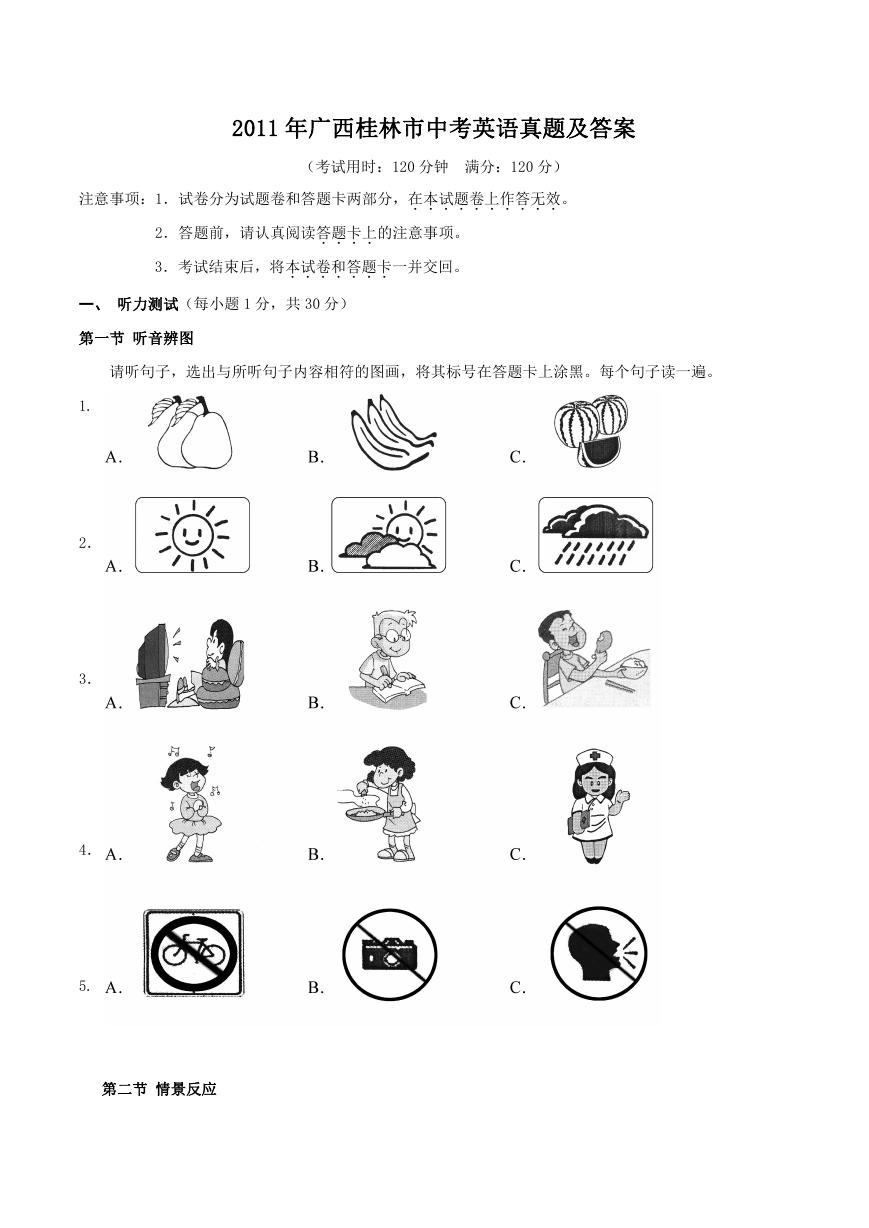
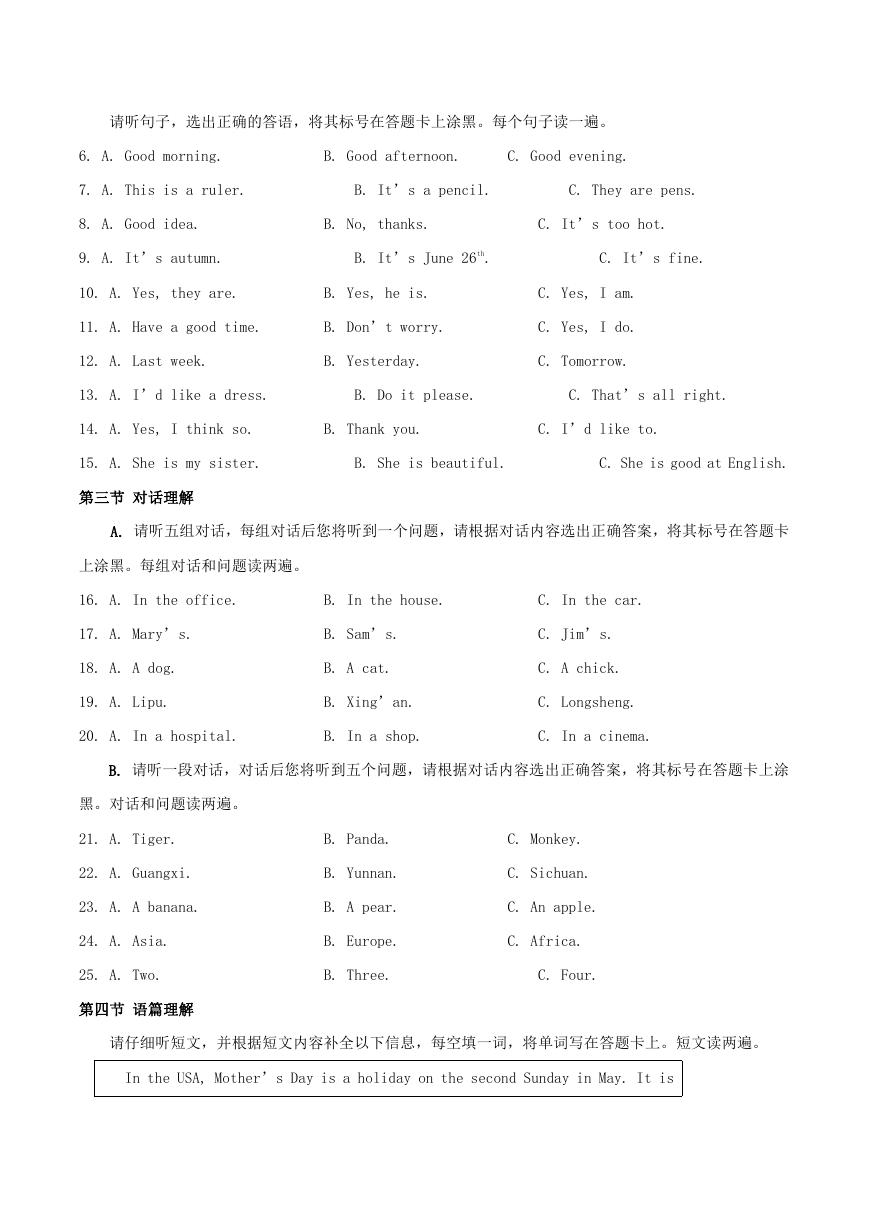
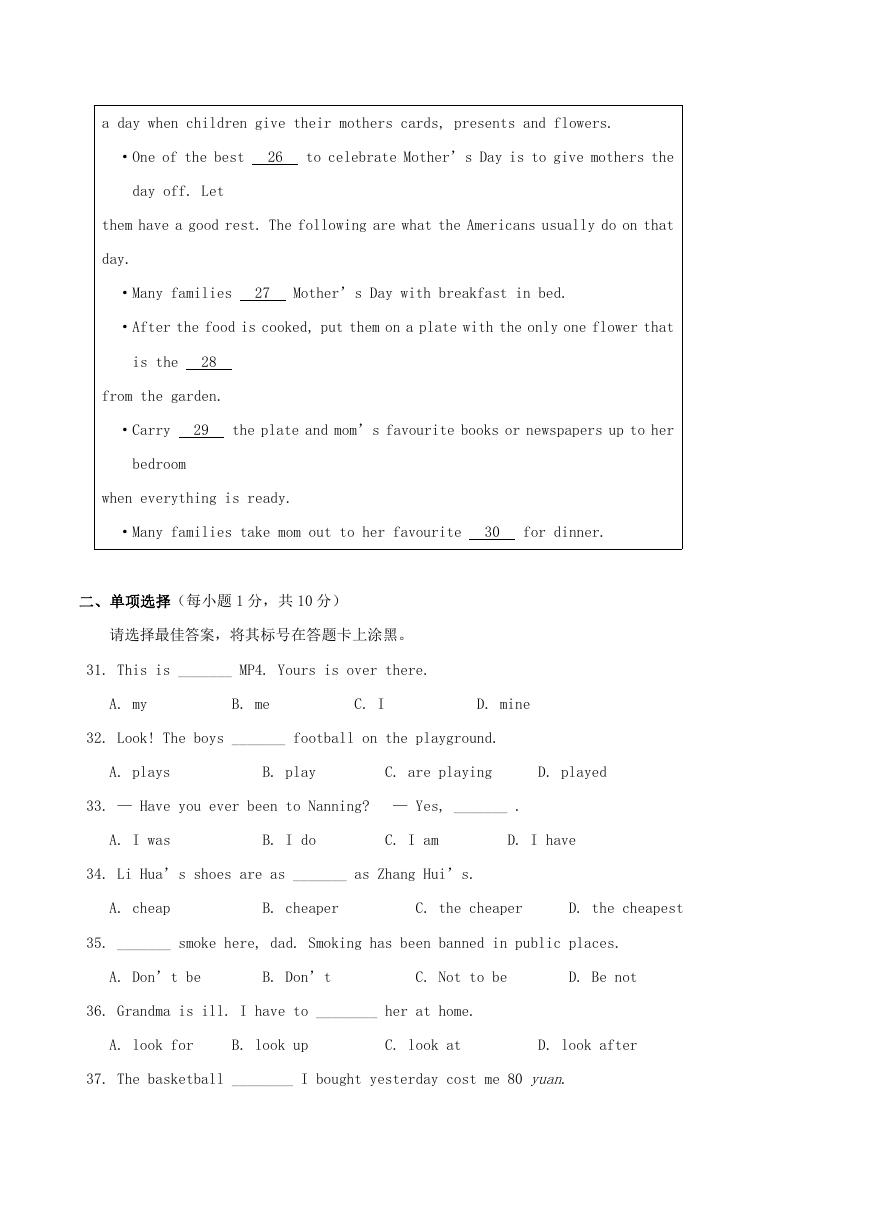
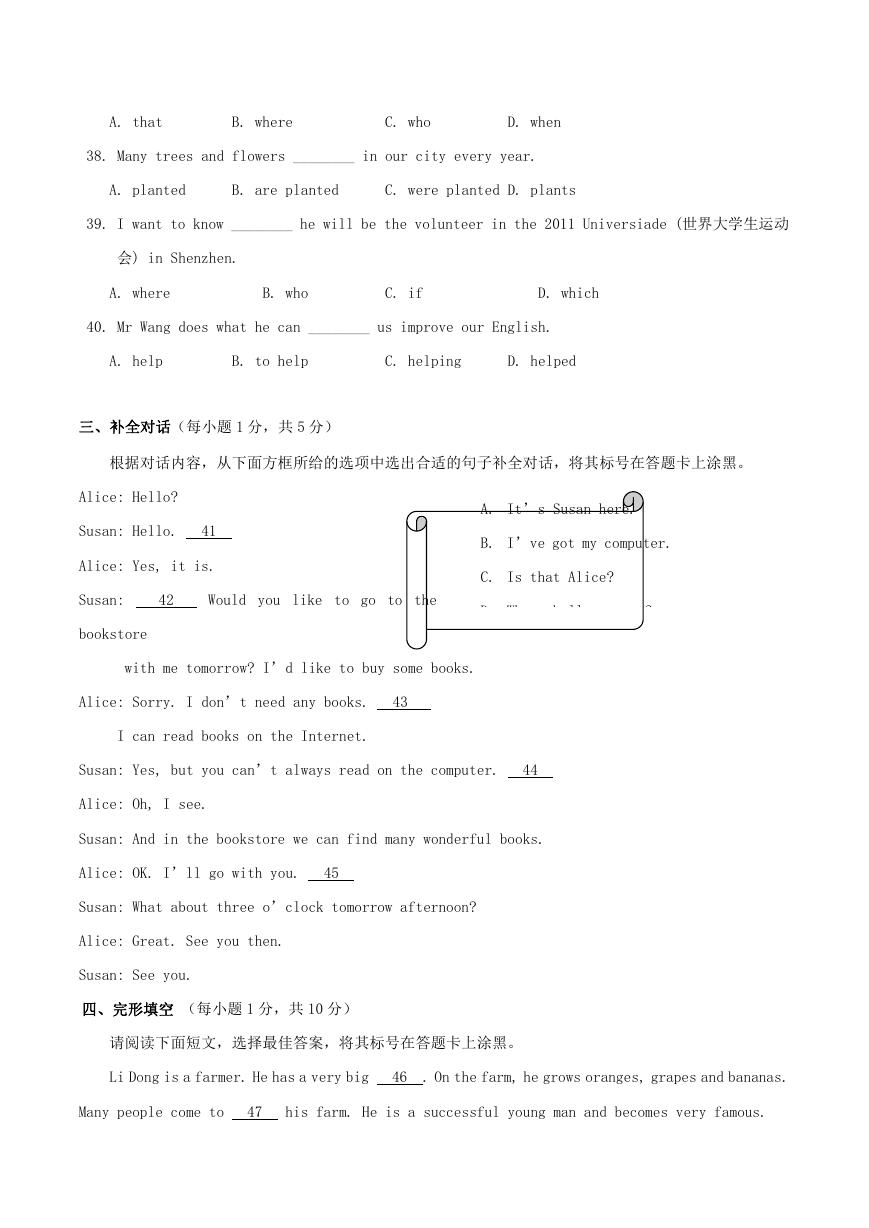
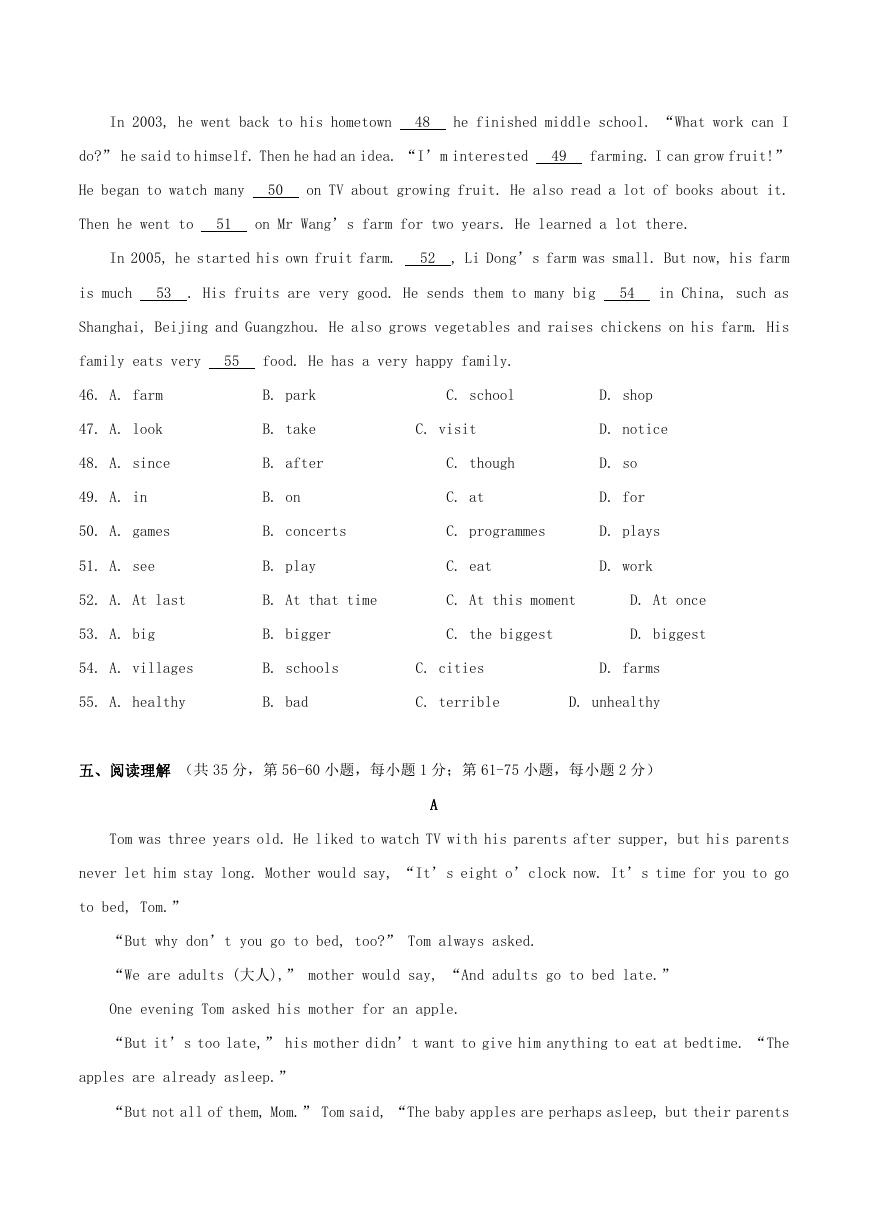
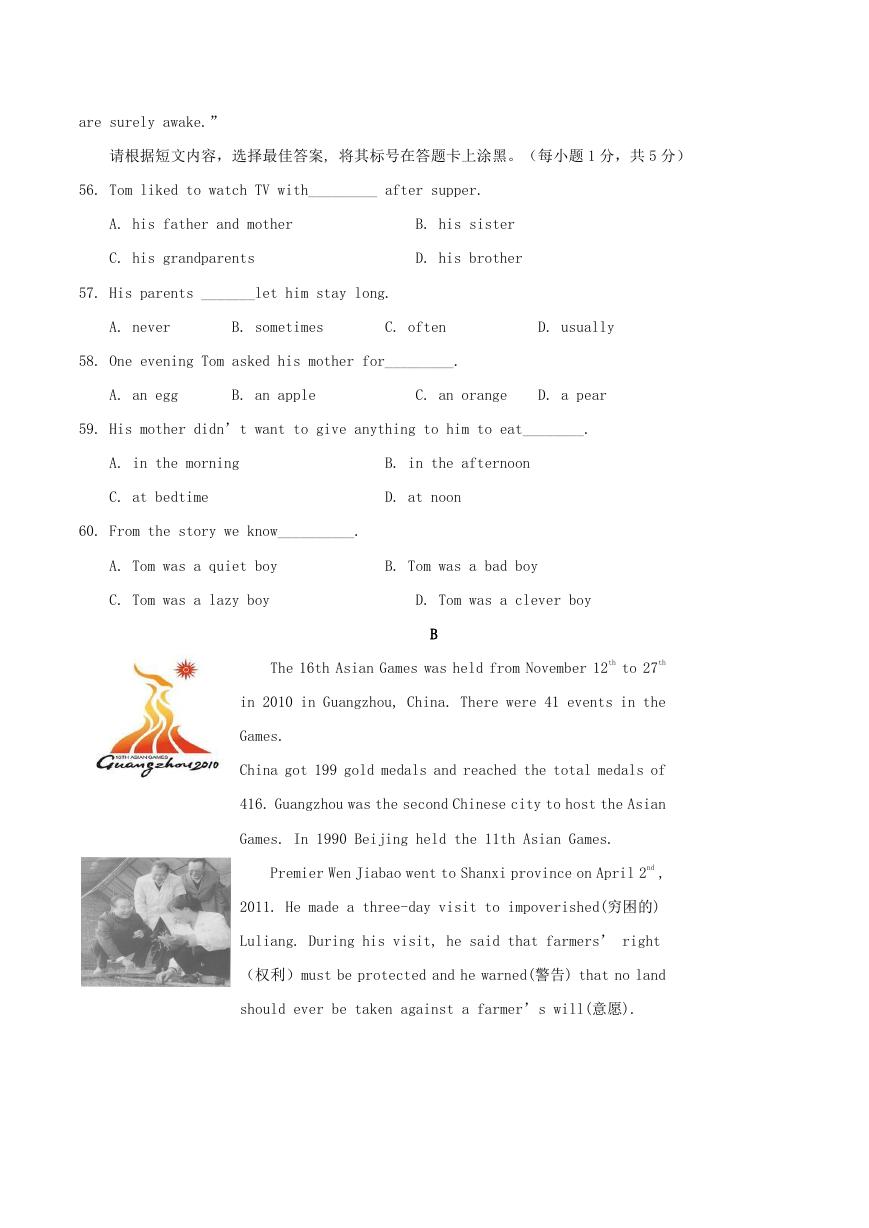
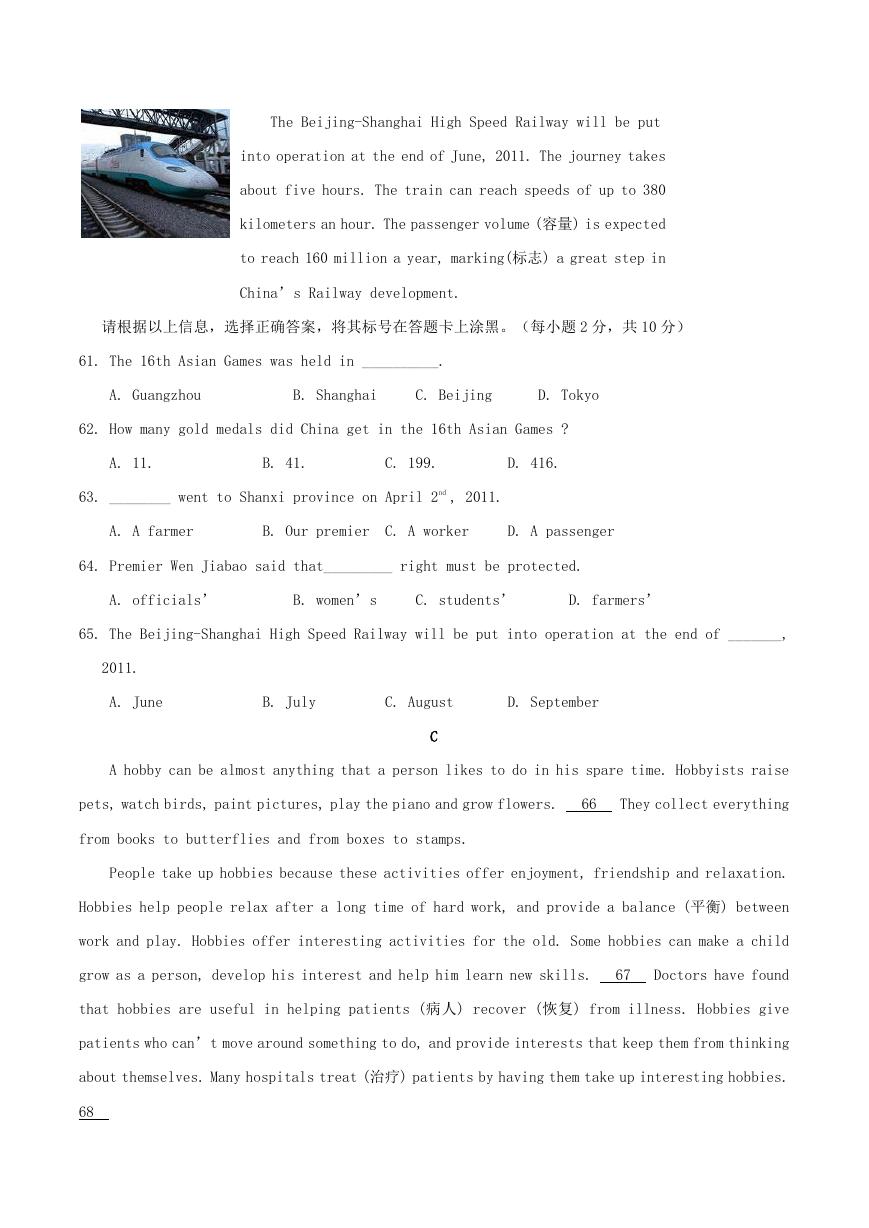
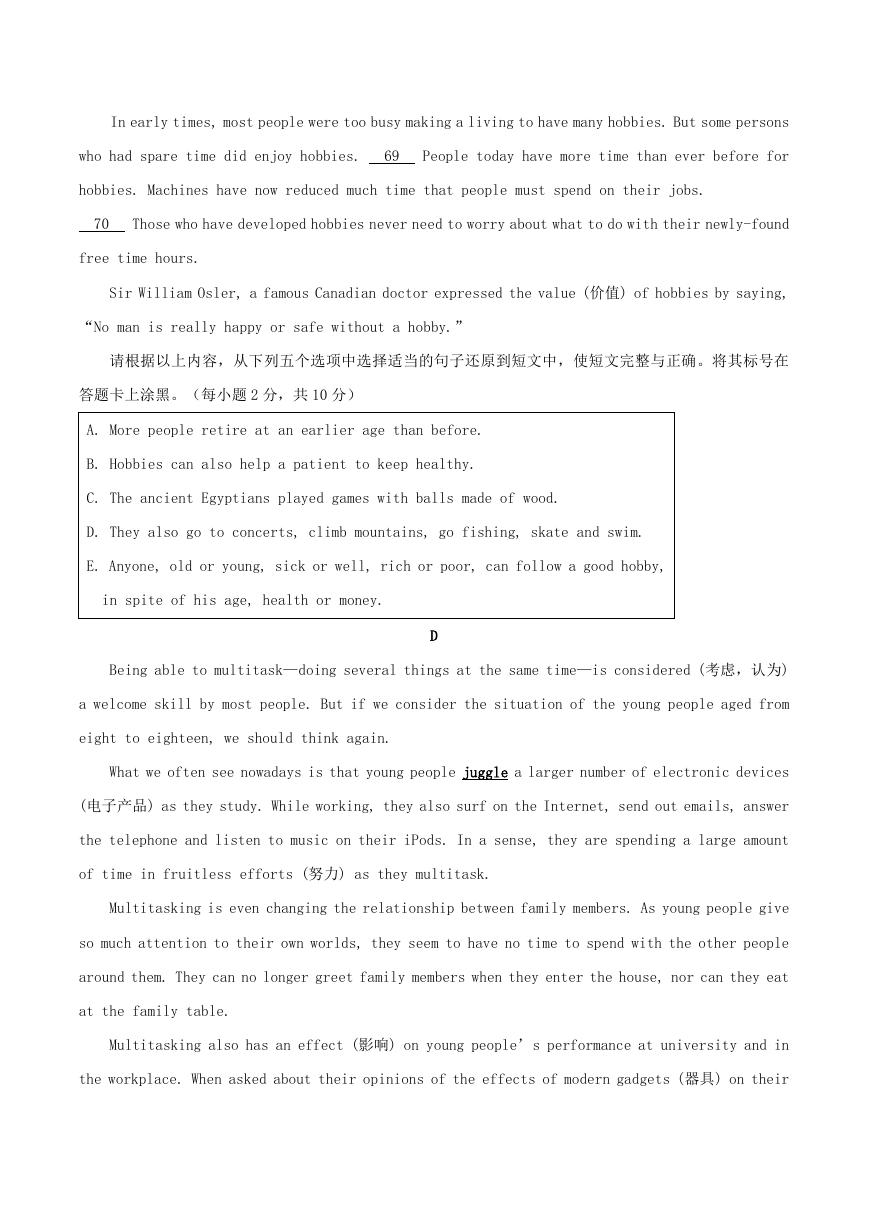








 2023年江西萍乡中考道德与法治真题及答案.doc
2023年江西萍乡中考道德与法治真题及答案.doc 2012年重庆南川中考生物真题及答案.doc
2012年重庆南川中考生物真题及答案.doc 2013年江西师范大学地理学综合及文艺理论基础考研真题.doc
2013年江西师范大学地理学综合及文艺理论基础考研真题.doc 2020年四川甘孜小升初语文真题及答案I卷.doc
2020年四川甘孜小升初语文真题及答案I卷.doc 2020年注册岩土工程师专业基础考试真题及答案.doc
2020年注册岩土工程师专业基础考试真题及答案.doc 2023-2024学年福建省厦门市九年级上学期数学月考试题及答案.doc
2023-2024学年福建省厦门市九年级上学期数学月考试题及答案.doc 2021-2022学年辽宁省沈阳市大东区九年级上学期语文期末试题及答案.doc
2021-2022学年辽宁省沈阳市大东区九年级上学期语文期末试题及答案.doc 2022-2023学年北京东城区初三第一学期物理期末试卷及答案.doc
2022-2023学年北京东城区初三第一学期物理期末试卷及答案.doc 2018上半年江西教师资格初中地理学科知识与教学能力真题及答案.doc
2018上半年江西教师资格初中地理学科知识与教学能力真题及答案.doc 2012年河北国家公务员申论考试真题及答案-省级.doc
2012年河北国家公务员申论考试真题及答案-省级.doc 2020-2021学年江苏省扬州市江都区邵樊片九年级上学期数学第一次质量检测试题及答案.doc
2020-2021学年江苏省扬州市江都区邵樊片九年级上学期数学第一次质量检测试题及答案.doc 2022下半年黑龙江教师资格证中学综合素质真题及答案.doc
2022下半年黑龙江教师资格证中学综合素质真题及答案.doc